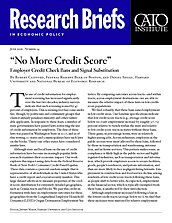The use of credit information for employment screening has increased significantly over the last two decades; industry surveys indicate that such screening is used by 47 percent of employers. This screening tool has come under fire, though, by politicians and community groups that claim it unfairly penalizes minority and other vulnerable applicants. In response to these fears, a number of state governments have passed laws restricting the use of credit information by employers. The first of these laws was passed in Washington State in 2007, and as of this writing, 10 states and 3 municipalities have such laws on the books. Thirty-one other states have considered similar laws.
Although state and local bans on the use of credit information have become increasingly popular, little research examines their economic impact. Our work explores this impact using data from the Federal Reserve Bank of New York’s Consumer Credit Panel/Equifax. These data contain a 5 percent random sample that is representative of all individuals in the United States who have a credit report and a social security number. This large dataset allows us to measure properties of the credit- score distribution for extremely detailed geographies, such as Census tracts and blocks. We pair this credit information with data on employment outcomes for these geographies from the Longitudinal Employer-Household Dynamics (LEHD) Origin-Destination Employment Statistics. By comparing outcomes across tracts — and within tracts, across employment destinations — we are able to measure the relative impact of these laws on low-creditscore populations.
We find, robustly, that these bans raised employment in low-credit areas. Our baseline specifications indicate that low credit score tracts (e.g., average credit score below 620) saw employment increase by roughly 3.7–7.5 percent relative to trends within the state and relative to low credit score tracts in states without these bans. These gains, in percentage terms, were in relatively higher-paying jobs. Across industries, employers in the public sectors were most affected by these bans, followed by those in transportation and warehousing, information, and in-home services. This pattern makes sense, as compliance is likely high in the public sector and highly regulated industries, such as transportation and information, which provide employees access to secure facilities, goods, people’s residences, and private information, and thus are more likely to face negligent-hiring lawsuits. Employment in construction and food service decline among residents of low credit score tracts following these bans, as people shift to better jobs. As expected, employment in the financial sector, which is typically exempted from these bans, is unaffected by their introduction.
Although employment increased following a ban in the lowest-credit tracts (average below 620), we find that these increases were mirrored by relative employment declines in mid-to-low credit score tracts (those with average scores between 630 and 650). Using new data on 74 million online job postings collected by Burning-Glass Technologies, we rationalize this finding by exploring employer experience and education requirements for new hires. A larger fraction of jobs in low-credit-score areas began requiring college degrees and prior work experience following a ban on credit screening. This is important evidence of substitution by employers across signals.
To explore the net impact of this shift for minority populations, we use data from the American Community Survey Integrated Public Use Micro Data. We compare labor market outcomes for blacks in states with and without bans, relative to prior trends and conditional on individual controls. We find that the introduction of a ban is associated with a 1 percentage point increase in the likelihood of being unemployed for blacks ages 25–65, relative to the contemporaneous change for other groups. Thus, it appears that the prohibition of credit screening and the increased emphasis on other signals may actually, relatively, hurt minority applicants.
Our research builds on a growing empirical literature on employer screening. Earlier work has suggested that lower credit scores are uncorrelated with employee performance and that some signals that seem to penalize minority applicants — a retail personality quiz and drug screening, respectively — actually do not do so in equilibrium. Further, earlier results indicate that employers who check criminal records are more likely to hire blacks, although some evidence suggests that people without criminal records from high-incarceration demographic groups do not have better labor market outcomes with increased testing.
NOTE
This research brief is based on Robert Clifford and Daniel Shoag, “‘No More Credit Score’: Employer Credit Check Bans and Signal Substitution,” Harvard University, May 2016, http://scholar.harvard.edu/files/shoag/files/clifford_and_shoag_final. pdf. The views expressed are those of the authors and do not necessarily reflect those of the Federal Reserve Bank of Boston or the Board of Governors of the Federal Reserve System.
